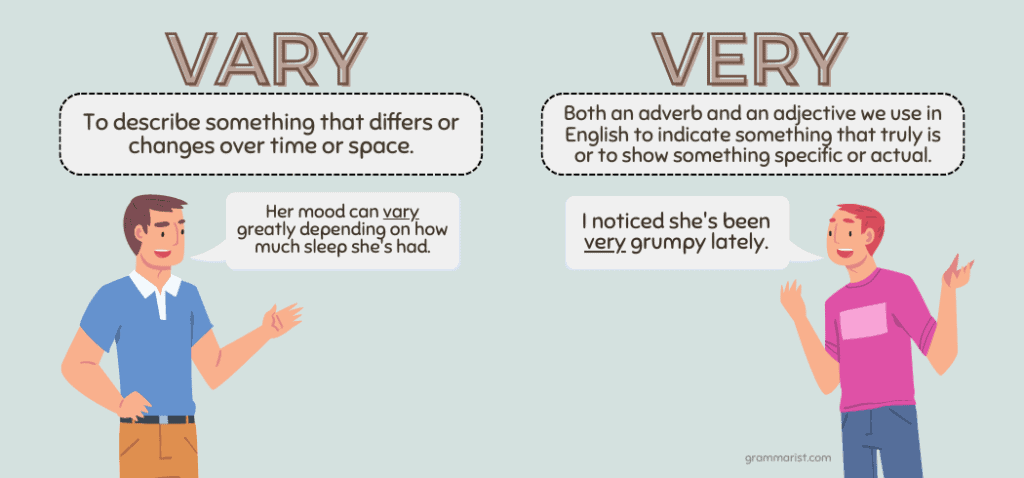Back when I was editing full-time, I once had the pleasure of editing a 100k-word manuscript that told a beautiful story. However, the author used “vary” in place of every single “very,” and it hurt my brain. If you think these words are the same, you’re in for an awakening because I’m about to explain the vast difference between them and show you how to properly use both in a sentence.
Vary vs. Very: Difference in Meaning

I know they only differ by a single letter, but that one letter makes their meanings worlds apart. “Very” is both an adverb and an adjective we use in English to indicate something that truly is. It’s also used to show something specific or actual.
- That ice cream is very cold. (adverb)
- We stood on this very spot ten years ago. (adjective)
Now, let’s move on to the verb “vary.” It’s a simple word to describe something that differs or changes over time or space. You can also use it to show how something or someone might change over time so things aren’t repetitive.
- The answer to that will vary depending on your tastes.
- I made sure the colors varied throughout the book.
When to Use Very and Vary
You should use the term “very” when you want to either emphasize or intensify an adjective or adverb. It usually goes before the word it modifies.
- Correct: I am very mad.
- Incorrect: I am mad very.
Use “vary” when you want to express a difference or change in something, like size, quantity or quality. It’s classified as a verb and is usually followed by the preposition “from” or “between.”
Another Word for Vary
Use any of these synonyms in place of the word vary.
- Differ
- Change
- Fluctuate
- Alter
- Diversify
- Modify
- Transform
Examples of Vary in a Sentence
- The colors of the leaves in Newfoundland vary from green to red and orange during the Fall.
- Pack accordingly for the trip because the temperature can vary vastly between day and night in the desert.
- Students’ opinions on the topic of gender studies varied widely.
- I have to warn you that the quality of the products varies depending on the supplier you use.
Very Examples in a Sentence

- Alison was very excited about her new job at the fashion house.
- The lemon cake my dad made was very delicious, so I ate every bit of it.
- I noticed that James walked very slowly because of his injured leg.
- The local museum is always very crowded during the holiday season, so we always wait until afterward to go.
- This is the very place we used to hang out before.
The More You Know
If you’re a writer, please get the difference between very and vary straight before sending anything to your editor. It’s such a simple mistake, but you’d be surprised how often we use the word “very” when writing. If you accidentally spell it as “vary,” it can be a nightmare during the editing process. Just remember that “vary” is like “varies.”

Comments are closed.